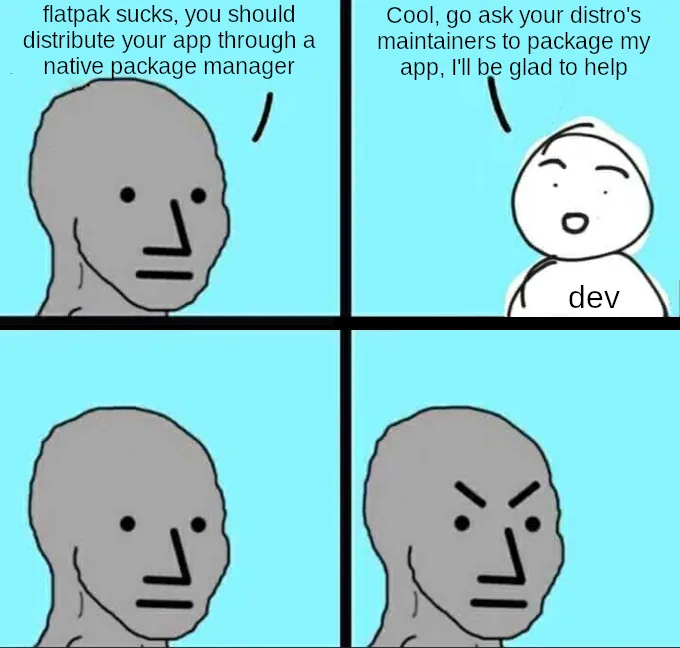this post was submitted on 05 Jul 2024
742 points (93.9% liked)
linuxmemes
22228 readers
574 users here now
Hint: :q!
Sister communities:
Community rules (click to expand)
1. Follow the site-wide rules
- Instance-wide TOS: https://legal.lemmy.world/tos/
- Lemmy code of conduct: https://join-lemmy.org/docs/code_of_conduct.html
2. Be civil
- Understand the difference between a joke and an insult.
- Do not harrass or attack users for any reason. This includes using blanket terms, like "every user of thing".
- Don't get baited into back-and-forth insults. We are not animals.
- Leave remarks of "peasantry" to the PCMR community. If you dislike an OS/service/application, attack the thing you dislike, not the individuals who use it. Some people may not have a choice.
- Bigotry will not be tolerated.
- These rules are somewhat loosened when the subject is a public figure. Still, do not attack their person or incite harrassment.
3. Post Linux-related content
- Including Unix and BSD.
- Non-Linux content is acceptable as long as it makes a reference to Linux. For example, the poorly made mockery of
sudoin Windows. - No porn. Even if you watch it on a Linux machine.
4. No recent reposts
- Everybody uses Arch btw, can't quit Vim, <loves/tolerates/hates> systemd, and wants to interject for a moment. You can stop now.
5. 🇬🇧 Language/язык/Sprache
- This is primarily an English-speaking community. 🇬🇧🇦🇺🇺🇸
- Comments written in other languages are allowed.
- The substance of a post should be comprehensible for people who only speak English.
- Titles and post bodies written in other languages will be allowed, but only as long as the above rule is observed.
Please report posts and comments that break these rules!
Important: never execute code or follow advice that you don't understand or can't verify, especially here. The word of the day is credibility. This is a meme community -- even the most helpful comments might just be shitposts that can damage your system. Be aware, be smart, don't remove France.
founded 2 years ago
MODERATORS
you are viewing a single comment's thread
view the rest of the comments
view the rest of the comments

Define "the OS package manager". If the distro comes with flatpack and dnf equally, and both are invoked by the generic "get updates" tooling, then both could count as "the" update manager. They both check all apps for updates.
Odd to advocate for docker containers, they always have the app provider also on the hook for all dependencies because they always are inherently bundled. If a library has a critical bug fix, then your docker like containers will be stuck without the fix until the app provider gets around to fixing it, and app providers are highly unreliable on docker hub. Besides, update discipline among docker/podman users is generally atrocious, and given the relatively tedious nature of following updates with that ecosystem, I am not surprised. Even best case, docker style uses more disk space and more memory than any other option, apart from VM.
With respect to never having to worry about bundled dependencies with rpm/deb, third party packages bundle or statically link all the time. If they don't, then they sometimes overwrite the OS provided dependency with an incompatible one that breaks OS packages, if the dependency is obscure enough for them not to notice other usage.